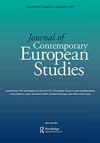欧盟和乌克兰说同一种语言吗?在军事干预之前的各种弹性概念
IF 1.8
3区 社会学
Q1 AREA STUDIES
引用次数: 0
摘要
本文章由计算机程序翻译,如有差异,请以英文原文为准。
Do the EU and Ukraine speak the same language? The various notions of resilience before the military intervention
ABSTRACT The concept of resilience has become a leitmotif for the current foreign policy narrative and practices of most Western states and international organisations. It has been more visible due to the pandemic crisis and accentuated significantly in the midst of the escalation between Ukraine and Russia. This article first discusses various notions of resilience, especially unpacking state-centred and societal approaches to resilience. In the empirical section, it identifies and compares the views and approaches to the resilience of the EU and Ukraine. The qualitative content analysis shows that their views on resilience identified in the official documents have differed substantially over the last few years. Yet, the top-down (or state-centred) approach clearly dominates in both environments. While the EU links resilience to stabilisation of the area, Ukraine has formulated the concept only recently, connecting it first with the desire to belong to the EU community, but soon tested it in the face of a Russian attack. Therefore, the war has triggered severe discussion, not only about the future commitment of the EU to the Eastern region but also pushes both actors (often unwillingly) towards adapting their societies in a rapidly changing world and possibly towards reformulating the concept as such.
求助全文
通过发布文献求助,成功后即可免费获取论文全文。
去求助
来源期刊

Journal of Contemporary European Studies
Multiple-
CiteScore
2.70
自引率
7.70%
发文量
84
期刊介绍:
The Journal of Contemporary European Studies (previously Journal of European Area Studies) seeks to provide a forum for interdisciplinary debate about the theory and practice of area studies as well as for empirical studies of European societies, politics and cultures. The central area focus of the journal is European in its broadest geographical definition. However, the examination of European "areas" and themes are enhanced as a matter of editorial policy by non-European perspectives. The Journal intends to attract the interest of both cross-national and single-country specialists in European studies and to counteract the worst features of Eurocentrism with coverage of non-European views on European themes.
 求助内容:
求助内容: 应助结果提醒方式:
应助结果提醒方式:


